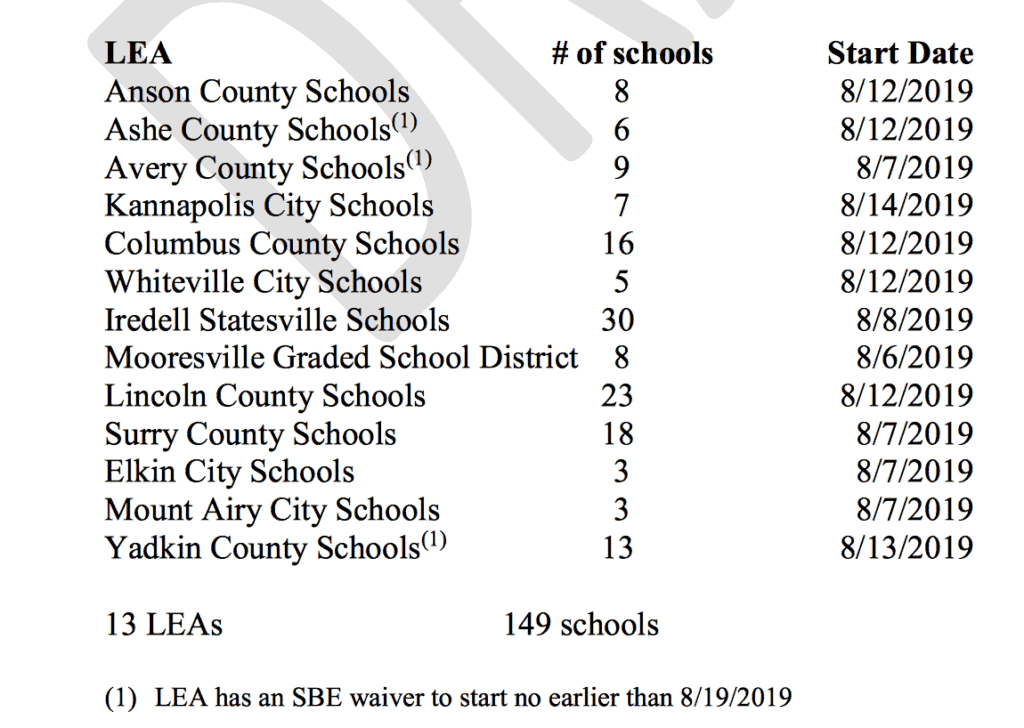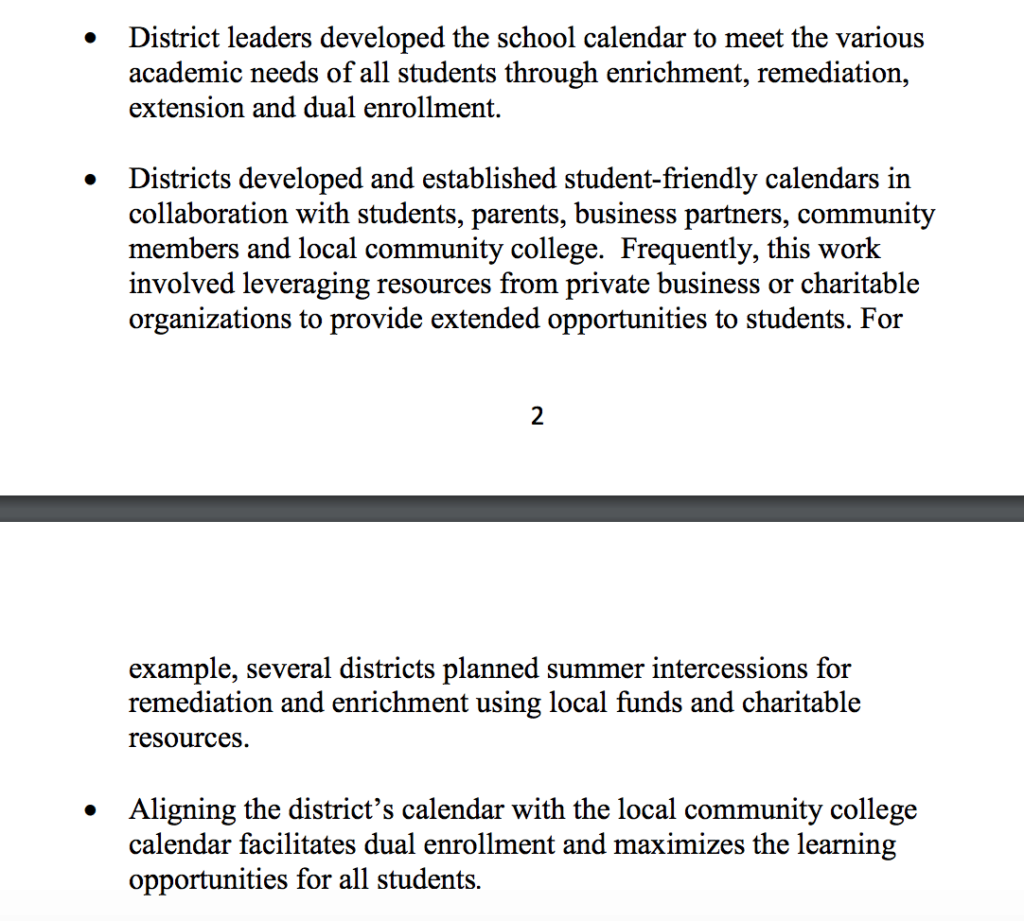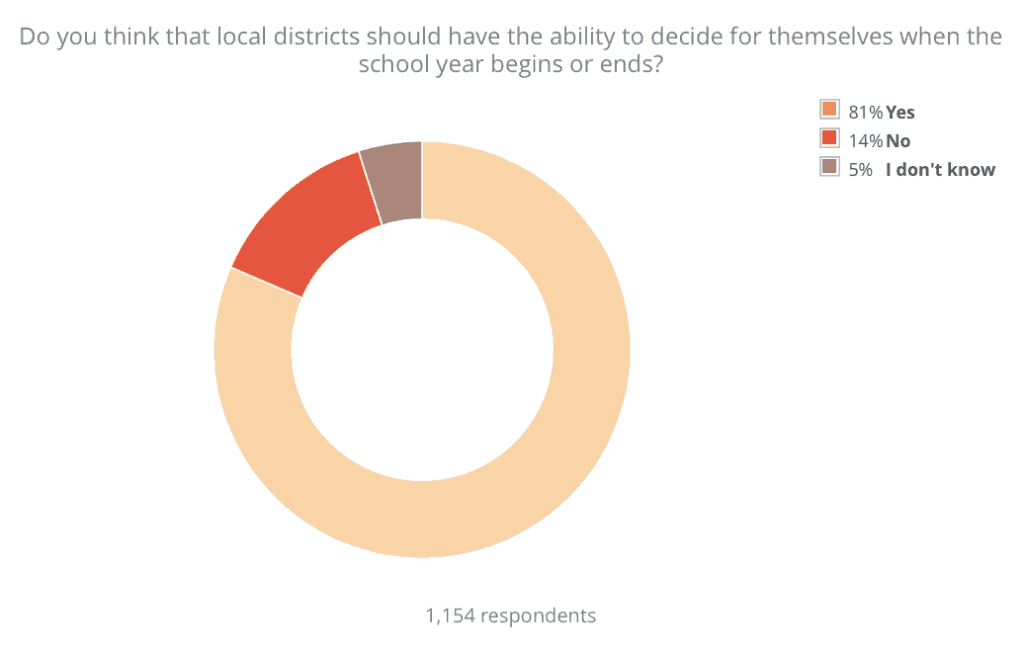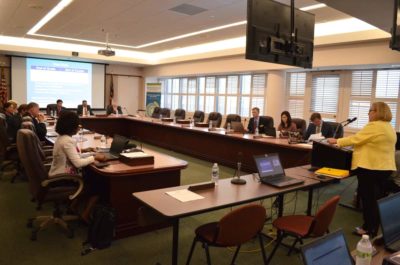

In the absence of school calendar flexibility, a number of school districts have bucked the state law mandating start dates for the school year and chosen to start their schools earlier.
The State Board of Education heard a report about these schools at its meeting last week. The following schools didn’t have calendar waivers — which give state sanction to earlier starts — and, nevertheless, began school early.


State law says that students must be in school for a minimum of 185 days a year or 1,025 hours of instruction. It also says that schools can’t start earlier than the Monday closest to Aug. 26, and they can’t end later than the Friday closest to June 11.
Each year, including this one, lawmakers attempt to push through legislation that would give districts calendar flexibility, allowing them to start school to meet their unique needs or to align with community colleges. So far, no bills have made it out of the legislature.
In the report to the General Assembly presented to the State Board, staff at the Department of Public Instruction initially said that DPI does not agree that the schools who started earlier than state law had the “authority” to do so.
After the State Board heard the report, State Board members directed staff to soften that language. The revised report no longer said that DPI disagreed, and it listed the numerous reasons why district superintendents started school early. Some districts said that what they were doing was consistent with the “flexible concept of ‘year-round school'” — using summer school programs to say that their schools qualify under the year-round designation.
Here are some more of the messages sent to DPI from superintendents around the state.


We wanted to know what you think, so we sent out questions around calendar flexibility and districts starting their school year earlier than state law allows using Reach NC Voices.
What people think about school calendar flexibility
The survey ran from August 26 through September 6. In that time frame, 1,973 people participated in the survey. Of the 1,963 people who chose to identify their profession, the majority — 91% — said they were teachers.
Thirty percent of the 1,876 people who answered a question about start dates said that their schools or districts were starting earlier than the start date mandated by law. Sixty percent of the 577 people who responded to a question about waivers said their school or district had one to start early.
Overwhelmingly, the 1,154 people who gave their opinions on whether districts should have the ability to decide for themselves when school starts and stops said that they should.


One complaint leveled at the state law is that some schools end up having to have their state exams after the Christmas break. Alex Reynolds said his school is starting early — and that fixes the problem for them.
“The early start has been incredible,” he wrote. “Knowing our high school will be done before Christmas with fall exams is thrilling.”
Virginia Schutt expanded in her comments on why pushing state exams until after Christmas is a problem.
“Delaying the start of the school year pushes those exam dates three weeks into January which requires teachers to spend two weeks reviewing material in hopes that the students will retain enough for success on state and local exams,” she wrote. “This is a huge waste of time and resources and in the end results in test scores being lower and student and teachers’ stress levels being higher.”
She goes on to says districts should determine the school calendar.
“The school calendar should be left to local school districts to determine, not the General Assembly who seem only to be interested in tourism and do not have an understanding of how the calendar impacts learning and students’ success. These children are the future of our state and their education should be in the hands of education professionals.”
Susan King said summer vacation shouldn’t dictate the school calendar.
“I don’t think that the beach should dictate when my kid goes to school in Mooresville… I think it’s awesome that we’re going to get out at the end of May. I think each district has different needs and should listen to their constituents.”
Jill Bellia brought up the topic of community colleges in her comments.
“School systems should be able to start when they want. I like that the calendar is aligned with community college as many high school students take those classes.”
Another common complaint lodged against the mandated start date is the fact that the restriction forces schools to go to drastic lengths to make up missed days. In the wake of hurricanes last year, the General Assembly had to waive make-up days for a number of districts that missed multiple weeks of school. With Hurricane Dorian hitting last week, some schools may end up facing more missed days this year. Emily Charette said calendar flexibility would help with that.
“Makes sense if we can build snow days into the year. The thing that does not make sense is starting Aug 26 and then having to extend school days or go to Saturday school to make up days.”
Not everybody agrees that schools should start early, however. Brenda Esselman said her district, the Iredell-Statesville School District, started early, and she said this causes numerous problems.
“This is bad business judgement and against the law. There is no sound reason for my district to do this,” she said. “The only reason given was to align the calendar with early college students. Early college are less than 0.5% of the student population. Also teachers get a 3 month summer job to supplement income, now, no one is hiring them for 60 days. Poor students work summer jobs to supplement income, now no one is hiring a student for 60 days. Plus now our district will pay higher electric bills for air conditioning schools during the hottest month of the year.”
Gina Chapman points out the reliance of the state on tourism.
“If we go back too early, the state loses money. I teach hospitality and tourism and I know for a fact our state can not afford to lose the revenue that tourism brings in.”
And some respondents commented that they were OK with calendar flexibility, but with some caveats.
Timothy Holland said it’s all right to start early, but districts need to be careful in how early they decide school goes back in session.
“Before the state calendar, one year we teachers went back to school in July. That is too early. The middle of August [would] be fine.”
And Don Jones Jr., said it all depends on the circumstances of the district.
“Rural vs urban districts should have the ability to start earlier or later, depending on the circumstances. Rural counties have students working, farming, etc. and should have the option to push the date back so farmers can get their crops harvested.”


